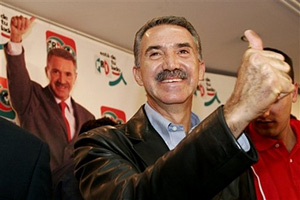 |
 |
 |
 News Around the Republic of Mexico | July 2006 News Around the Republic of Mexico | July 2006  
Once-Powerful PRI now Trying to Survive
 Ioan Grillo - Associated Press Ioan Grillo - Associated Press


| | Roberto Madrazo, the presidential candidate of the Institutional Revolutionary Party, PRI, gives the thumbs up at his campaign headquarters in Mexico City, after the closing of presidential election, Sunday, July 2, 2006. Mexico's presidential election was too close to call Sunday as electoral officials were conducting a quick count of the votes. (AP Photo/Marco Ugarte) |
Amid the confusion surrounding Mexico's presidential election, one thing was clear Monday: The Institutional Revolutionary Party's historic defeat six years ago was not a fluke.

The PRI, which ruled Mexico for 71 years until it was narrowly defeated by Vicente Fox in 2000, got a painful beating at the polls Sunday.

Its presidential candidate finished third — at least 13 percentage points behind the front-runners — and it lost its plurality in Congress for the first time since it was formed in 1929, preliminary results indicated.

The trouncing raises questions about the future of the party, which suffered infighting and defections during the campaign.

"The one thing that kept the PRI going was the hope it would recover power in this election. Now it has little to look forward to," political analyst Oscar Aguilar said.

At PRI headquarters in Mexico City, presidential hopeful Roberto Madrazo greeted the results with stunned disbelief. The 53-year-old marathon runner and lifelong PRI militant grinned and refused to answer questions while the party president read a declaration saying the PRI would scrutinize the results.

Even so, the close presidential race between Felipe Calderon and Andres Manuel Lopez Obrador could give the party a new mission, allowing it to emerge as a powerbroker in Congress.

"The PRI is the kingmaker," said political analyst Federico Estevez. "If they make the right deals, they can get themselves several Cabinet positions."

Both Calderon and Lopez Obrador promised to form coalition governments if elected.

To survive, the PRI will have to overcome many obstacles. For starters, its support is strongest among older, rural voters in a nation with an increasingly young, urban population.

It also lacks a clear ideology, clinging to its all-inclusive platform of governing for anyone who would vote for it. Its supporters included trade unionists, businessmen, peasants and intellectuals.

The catchall policy helped unite the country after a bloody revolution and kept the party in power for seven decades. But today, it is a difficult sell to voters who are increasingly polarized between the left and the right.

During the campaign, several left-leaning PRI politicians endorsed Lopez Obrador, while some prominent conservative PRI members joined ranks with Calderon.

Aguilar said the PRI could collapse, creating a two-party system akin to that of the United States.

"The PRI looks like a party that it is torn apart from the inside out," Aguilar said. "Unless it changes radically, it could disappear as a national force." | 
 | |
 |



